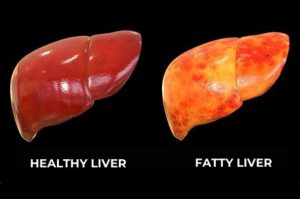What is Fatty Liver? | Why Does Fatty Liver Happen? | Diet for Fatty Liver: What to Eat and Avoid | Prevention of Fatty Liver
eshoiorg
- March 5, 2025
What is Fatty Liver?
Fatty liver, or hepatic steatosis, is a condition where excess fat accumulates in the liver. While it’s normal for the liver to contain some fat, problems arise when fat makes up more than 5-10% of the liver’s weight. There are two primary types:
- Non-Alcoholic Fatty Liver Disease (NAFLD): This form is unrelated to alcohol and is often linked to metabolic issues like obesity, insulin resistance, and type 2 diabetes.
- Alcoholic Fatty Liver Disease (AFLD): Caused by excessive alcohol consumption, this type can progress to more severe liver damage if drinking continues.
If left untreated, fatty liver can lead to inflammation, scarring (fibrosis), cirrhosis, and even liver failure. The good news? It’s largely preventable and reversible with the right approach.
Why Does Fatty Liver Happen?
The liver is a vital organ responsible for processing nutrients, filtering toxins, and regulating fat metabolism. When this balance is disrupted, fat begins to build up. Here are the key reasons behind fatty liver:
- Poor Dietary Choices: A diet high in refined sugars, unhealthy fats, and processed foods overwhelms the liver, leading to fat accumulation. Sugary drinks and excessive carbohydrate intake are particularly harmful.
- Sedentary Lifestyle: Lack of physical activity contributes to weight gain and insulin resistance, both of which increase the risk of fatty liver.
- Obesity: Excess body fat, especially visceral fat around the abdomen, is a major risk factor for NAFLD.
- Insulin Resistance and Diabetes: When the body becomes resistant to insulin, it struggles to regulate blood sugar, prompting the liver to store more fat.
- Alcohol Consumption: Even moderate drinking can strain the liver, while heavy drinking significantly raises the risk of AFLD.
- Genetic Factors: Some people are genetically predisposed to developing fatty liver, regardless of lifestyle.
- Rapid Weight Loss: Losing weight too quickly can shock the liver and lead to fat accumulation.
Diet for Fatty Liver: What to Eat and Avoid
Diet plays a crucial role in both preventing and managing fatty liver. Here’s a guide to what you should include and avoid:
Foods to Eat:
- Leafy Greens: Spinach, kale, and other greens are rich in antioxidants and help reduce liver fat.
- Healthy Fats: Incorporate sources of omega-3 fatty acids like salmon, walnuts, and flaxseeds, which reduce inflammation.
- Whole Grains: Opt for quinoa, brown rice, and oats, which provide sustained energy and improve insulin sensitivity.
- Lean Proteins: Choose chicken, turkey, tofu, and legumes to support liver repair and function.
- Fruits: Berries, apples, and citrus fruits are high in fiber and antioxidants, which benefit liver health.
- Nuts and Seeds: Almonds, chia seeds, and sunflower seeds are great for snacking and provide healthy fats.
- Green Tea: Known for its antioxidant properties, green tea can help reduce liver fat.
Foods to Avoid:
- Sugary Foods and Drinks: Sodas, candies, and desserts contribute to fat buildup in the liver.
- Refined Carbs: White bread, pasta, and pastries spike blood sugar levels and promote fat storage.
- Fried and Processed Foods: These are high in unhealthy fats that strain the liver.
- Alcohol: Even in small amounts, alcohol can worsen liver damage.
- Red and Processed Meats: These are high in saturated fats and can increase inflammation.
Prevention: How to Keep Your Liver Healthy
Preventing fatty liver is all about making sustainable lifestyle changes. Here are some actionable steps:
- Adopt a Liver-Friendly Diet:
- Focus on whole, unprocessed foods and avoid sugary, fatty, and fried foods.
- Incorporate plenty of fiber-rich fruits, vegetables, and whole grains.
- Exercise Regularly:
- Aim for at least 150 minutes of moderate-intensity exercise per week, such as walking, cycling, or swimming. Exercise helps burn fat and improve insulin sensitivity.
- Maintain a Healthy Weight:
- If you’re overweight, aim for gradual weight loss (1-2 pounds per week). Even a 5-10% reduction in body weight can significantly improve liver health.
- Limit Alcohol Consumption:
- If you drink, do so in moderation. For those with NAFLD, it’s best to avoid alcohol altogether.
- Stay Hydrated:
- Drinking plenty of water helps the liver flush out toxins and function efficiently.
- Manage Underlying Conditions:
- Keep conditions like diabetes, high cholesterol, and hypertension under control with medication and lifestyle adjustments.
- Avoid Fad Diets:
- Extreme diets can harm the liver. Instead, focus on balanced, nutrient-rich eating.
- Get Regular Checkups:
- Routine blood tests and liver function tests can help detect fatty liver early, allowing for timely intervention.
Final Thoughts
Fatty liver is a growing health concern, but it’s also one that we can effectively prevent and manage through mindful choices. By adopting a liver-friendly diet, staying active, and maintaining a healthy lifestyle, we can protect this vital organ and improve our overall well-being. Remember, your liver is incredibly resilient, but it needs your support to function at its best. Start making small changes today—your liver (and your future self) will thank you!
Contact
32/1, North Mugda, P.O : Basabo, P.S : Mugda, Dhaka-1214, Bangladesh
Mobile: +8801712-651032
Copyright © 2025 Hello Charity | Powered by SoftWeb IT


